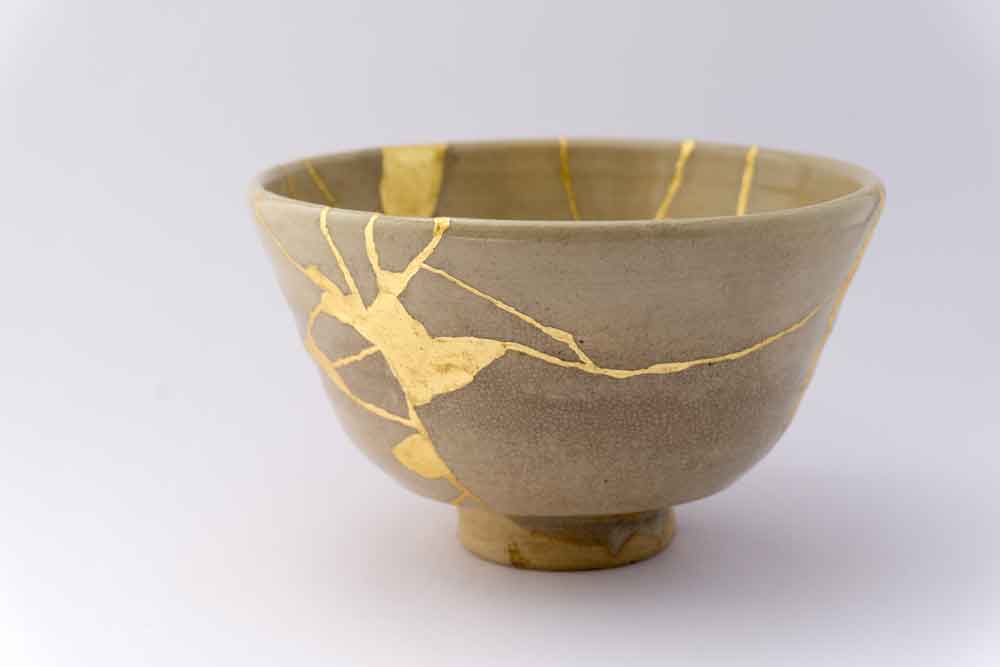In a world rife with high stress levels, fast-paced living, unrealistic ambitions of perfection, and a debilitating addiction to worldly materialism, an old Japanese way of life may be just what we need right now to preserve us.
Wabi-Sabi is a beautiful Japanese philosophy that refers to a more connected way of life—a way of life in which we are closely connected to nature and hence to our own inner selves. Wabi-Sabi encourages us to look for beauty in imperfection and accept life's natural cycle. It serves as a reminder that everything, including ourselves and life itself, is transient, incomplete, and flawed. As a result, perfection is impossible, and impermanence is the only option.
Wabi and Sabi are two distinct notions when considered separately:
• Wabi is about recognising beauty in basic simplicity. Essentially, it encourages us to detach from materialism, and instead, involve ourselves with spiritual richness.
• Sabi is fascinated by the passage of time, how all things develop, age, and decay, and how it presents itself in items in beautiful ways. It implies that beauty can be found beneath the surface of what we see, even in what we originally consider to be broken.
Accept what is, stay in the present moment, and appreciate the simple, ephemeral stages of life: these two notions, when combined, form an overarching philosophy for handling life.
Within the very fabric of this age-old philosophy, there lies a wealth of insight. Here are five Wabi-Sabi teachings to help you entirely move away from the modern-day problems of moving quickly, aiming for perfection, and chasing inorganic kinds of achievement.

1. Acceptance leads to freedom, and progress follows from acceptance
The Dewa Sanzan is a mountain range in northern Japan that is relatively unknown. It has been a sacred pilgrimage location for Yamabushi monks since the eighth century, who participate in yearly rites seeking rebirth and enlightenment for their mind, body, and soul. Uketamo, which means 'I humbly accept with an open heart,' sums up their training philosophy in a single word.
Uketamo entails complete acceptance. The Yamabushi recognised that the sooner you accept all of life's wonderful and negative aspects, the lighter you will feel. They came to the conclusion that acceptance leads to freedom, which leads to growth.
The Wabi-Sabi philosophy's first tenet is to practise gratitude and acceptance. It's not a question of giving up. It's about accepting the gravity of the problem and then actively participating in the decision-making process.

2. Because everything in life, including you, is in a state of change, aim for excellence rather than perfection
Nothing can ever be completely perfect in nature if everything is always changing. Nothing can ever be perfect because perfection is a condition of wholeness. As a result, the Wabi-Sabi philosophy teaches us that everything is ephemeral, incomplete, and imperfect, including ourselves and life itself.
Our defective habits of thinking, on the other hand, have distorted our grasp of what perfection actually is. We pursue the mirage of perfection in the hopes of feeling deserving and good enough within ourselves.
But here's the truth: Perfection does not exist because imperfection is a natural state of life—you are whole, and perfect as you are.
To get rid of the negative stigma associated with imperfection, we must first reject it as 'the polar opposite' of perfection, which is a false construct. Imperfection is not a compromise; imperfection is the only way since it is the fundamental nature of things, according to a new narrative.
The second tenet of the Wabi-Sabi philosophy is straightforward: strive for excellence rather than perfection.
To put it another way, just do your best to be the best you can be.

3. Appreciate all things for their beauty, especially the enormous beauty that lies beneath the surface of what appears to be damaged
Wabi-Sabi mentions an ancient type of art in which shattered artefacts are repaired with gold fillings, resulting in 'golden scars - Kintsugi.
Consider a dish or teapot that has fallen to the floor. What would you do with it? You'd most likely pick up the pieces and discard them. With Kintsugi, however, this is not the case. You glue the shards of broken pottery back together with liquid gold in this step. It ends up being imperfect, always and inevitably defective, but nevertheless more beautiful.
Kintsugi tells us that shattered things have immense beauty because scars tell a story. They have earned the qualities of fortitude, knowledge, and resilience with the passage of time. Why hide these flaws or golden scars when they're supposed to be celebrated?
The concept is simple: you will feel broken numerous times throughout your life. There will be times when you will be left with emotional or bodily scars as a result of circumstances. Don't hide in your own shadow. Do not let the blackness of a cloud dull your own light. Let those scars be repainted in gold instead.
Consider this: your failures are there to teach you what not to do, your mistakes are there to teach you the value of forgiveness, and your wrinkles are there to remind you of the laughs that generated them.

4. The only way to feel the thrill of what it means to be alive is to take it slowly and simply
You may be wondering how you can perceive the beauty that lies beneath the surface. When everything looks so gloomy and grim, how can you discover beauty in everyday life?
The answer to those problems can be found in the fourth teaching of the philosophy: slow down and simplify your life. Otherwise, you'll rush through it and ask, 'What was the point?' when you get to the finish. This lesson is straightforward, but it has significant short- and long-term repercussions.
This is why:
a. Slowing down is the cure to a frantic pace of life. Slowing down allows you to become more aware of your surroundings. As a result, you will become more self-aware. Why? Because the moment you slow down, you make room for yourself to halt and ponder, to wonder and ask questions. You become more aware of your surroundings as a result of this.
b. Living a simple life is the antidote to living a complicated existence. When you want to make a change in your life, the first question you should ask isn't 'what do I need to add,' but 'what do I need to remove?' Decluttering is an important step on the path to change and growth. Letting go of what is not in alignment with yourself will make room for things that will.
Slow down, simplify your life, and focus on what’s really important to you. That is the heart of the fourth teaching. If you want to feel the joy of everyday life, you must become more intentional.

5. To be happy, you must be comfortable with where you are and what you currently have
The pursuit of happiness has become an obsession in modern life. The next huge project. The most recent buy. The most fashionable accessory. On the surface, happiness appears to be something we have to work for.
The truth is that our fixation with finding happiness has obliterated our understanding of what happiness is: an emotion.
It's just a different feeling.
We experience happiness and sadness in the same way that we experience anger, sadness, fear, or excitement. You can't be pleased all of the time, and you can't be enthusiastic all of the time, either.
So, what exactly is the issue with chasing success? To begin with, it will constantly elude you. Second, it's nearly difficult to remain content all of the time.
This is where the last Wabi-Sabi lesson comes into play. It tells us to be content.
To be content with the emotion of rage, just as you are with the emotion of joy most of the time. To be content with your current state of grief, just as you are with your current state of happiness.
Because being dissatisfied with where you are and what you have is the basis of all misery. That is all there is to it.
Spending all of your waking hours casting your gaze out into the distant future and gazing outside your life, rather than opening your eyes to the present and looking inside it, is the source of all sadness.
Being grateful is being content with what you have and where you are. Being intentional is being content with what you have and where you are while working toward what you want and fully trusting that you can attain it. And happiness is found via gratitude, intention, and action.
But what about the beauty of it all? It all comes back to the first Wabi-Sabi principle: Acceptance is contentment, and contentment is acceptance.
In Conclusion
Wabi-Sabi is a lovely philosophy to include into your daily life.
But, at its core, Wabi-Sabi reminds you that life is fragile and fleeting, just like everything else in nature, so why not allow yourself to be exactly who you are?